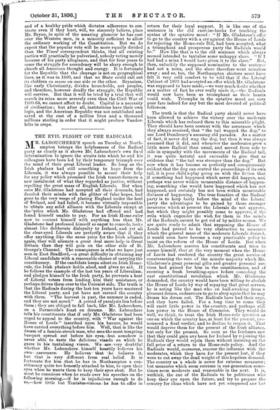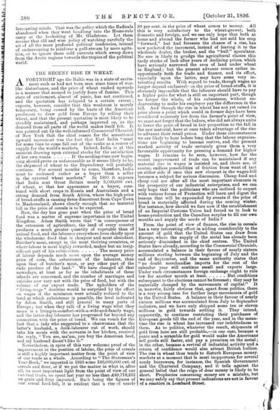THE EVIL PLIGHT OF THE RADICALS.
MR. LABOUCHERE'S speech on Tuesday at North- ampton betrays the helplessness of the Radical party as clearly as it shows Mr. Labouchere's own fixed determination to ignore the straits into which he and his colleagues have been led by their temporary triumph over the mind of their great Liberal leader. So long as the Irish phalanx had still something to hope from the Liberals, it was always possible to secure their help for any policy which promised the Irish tenant-farmers a new instalment of what they regarded as justice, without repelling the great mass of English Liberals. But when once Mr. Gladstone had accepted all their demands, had dazzled their minds with the glitter of false hopes, had gonelo the very verge of placing England under the heel of 'Ireland, and had failed, it became virtually impossible to obtain any solid alliance with the Liberals except at thelPrice .which Mr. Gladstone had offered and had fotimd himself unable to pay. For an Irish Home-ruler now to content himself with anything less than Mr. Gladstone-had professed himself so eager. to concede, looks almost like deliberate disloyalty to Ireland, and-. yet all the clear-eyed. Liberals are perfectly aware that if they offer anything dike the same price for the Irish alliance again, they will alienate- a. great deal more help in Great Britain than they will gain on the other side of St. George's Channel. The consequence is _what we have just seenin East Bradford,--,a great difficulty in obtaining any Liberal candidate with a reasonable chance of carrying the constituency. If the candidate keeps silent on Irish Home- rule, the Irish phalanX holds aloof, and gives no aid. If he follows the example of the last ten years of Liberalism, and pledges himself to the Irish party, he prevents a host of 'Liberal voters from lendingk him their assistance, or perhlips drives them overtathe Unionist side. The truth is that the Radicals during the last-ten years have mastered the Liberal party, and yet have not carried the country with them. "The harvest is past, the summer is ended, and they are not saved." A period of paralysis lies before them ; they are obliged to fall back, like Mr. Labouchere, on a Barmecide's feast on dreams. Mr. Labouchere tells his constituents that if only Mr. Gladstone had been urged to appeal to the country, with "War against the House of Lords" inscribed upon his banner, he would have carried everything before him. Well, that is like the dream of a famine-struck man, who seewthe most tempting banquet: spread, out before his syesaabut somehow is never able to taste the delicious -viands on which he gazes in his tantalising .vieien. We- .are very doubtful whether Mr. Labouchere- himself heaatily believes, his own', assurance. He.' believes' that the believes it, but that is very different from real _belief. It is fortunate ,for him .that he has in Northampton a. con- stituency quite too honestlyattached to him, to open their eyes when he 'ants. them to keep their eyes shut. But he, must be conscious when he reads over his speeches on the following morning,—if he is injudicious enough to do so,—how little but Tantaiavvisiona, he has tthoffer in return for their loyal support. It is like one of the sentences in the old exercise-books for teaching the syntax of the optative mood : "If Mr. Gladstone's offer to go to the country with a cry against the House of Lords for rejecting the Home-rule Bill, had been accepted, what a triumphant and prosperous party the Radicals would be." How like that is to the old sentence which always seemed intended to tantalise some unhappy slave. "If I had had a mina I would have given it to the slave." But, then, unluckily the supposed nominative to the sentence had not a mina, and the slave therefore went minaless away ; and so, too, the Northampton electors must have felt it very cold comfort to be told that if the Liberal Cabinet of 1893 had accepted an offer which Mr. Gladstone was supposed to have made,—we very much doubt whether as a matter of fact he ever really made it,—the Radicals would now have been as triumphant as their hearts could wish. Triumphs in the optative mood are very poor fare indeed for any but the most devoted of political followers.
The truth is that the Radical party should never have been allowed to achieve the victory over the moderate Liberals which has reduced them to this miserable plight. They should have been content with the assurance which they always received, that "the tail wagged the dog," to use Lord Dundreary's amusing old paradox. As a matter of fact, it never did wag the dog, but then it was always assumed that it did, and whenever the moderates grew a little more Radical than usual, and moved from side to side in sympathy with the movements of the Radical tail, it was quite natural and excusable to give that as evidence that "the tail was stronger than the dog." But now when it has become so perfectly and conspicuously evident that the dog can control the proceedings of its own tail, it is poor child's-play going on with the fiction that if something had happened which never did happen, and perhaps was never within measurable distance of happen- ing, something else would have happened which has not happened, and certainly has not been within measurable distance of happening. The true function of the Radical party is ta keep fairly before the mind of the Liberal party the advantages to be gained by those stronger measures which at present the Liberals do not approve, but which they might possibly come to approve, if the evils which engender the wish for them in the minds of the Radicals, cannot be got rid of by milder means. We are 'quite ready to admit that supposing the House of Lords had proved to be very obstructive to measures which the general mass of the moderate Liberals desired, it would soon have become a very practicable policy to insist on the reform of the House of Lords. But when Mr. Labouchere assures his constituents and tries to assure himself, that at the very moment when the House of Lords had rendered the country the great service of counteracting the. vote, of the minute majority which Mr. Gladstone'e great personal gifts and greater personal ser- vices had gained for him in the constituencies, and of securing a fresh breathing-space before conceding the vast constitutional revolution which Mr. Gladstone demanded, the country would have been willing to abolish the House of Lords by way of repaying that great service, he is acting like the man who on half-awaking from a, pleasant dream, endeavours to go to sleep again that be may dream his dream out. The Radicals have had their orgy, and they have failed. For a long time to come they will exert little power in the country, and perhaps still less power in the House of Commons. They would do well, we think, to treat the Irish Home-rule question as one on which the country has, at least for the present, pro- nounced a final verdict, and to decline to reopen it. That would deprive them for the present of the Irish alliance, but only for' the present. So soda as the Irishmen saw that they could gain any boon for Ireland by rejoining the Radicals they would rejoin them without insisting on the full price of a return to the Home-rule policy. And the Radicals would, moreover, recover- the influence with the moderates, which they have for the present lost, if they were to cut away the dead weight of this hopeless demand. The country as a whole, is never for extreme measures ; but measures which seem extreme in one generation some- times seem moderate and reasonable in the next. It is, wethink, the cue of the Radicals to be politicians who keep their eye upon the future, and try to prepare the country for ideas which have not yet conquered any but forecasting minds. That was the policy which the Radicals abandoned when they went headlong into the Home-rule camp at the beckoning of Mr. Gladstone. Let them resume that old and wise policy of watching carefully the set of all the more profound political tendencies, instead of endeavouring to reinforce a gulf-stream by mere agita- tion, or to ignore those cold currents which sweep down from the Arctic regions towards the tropics of the political world.











































 Previous page
Previous page